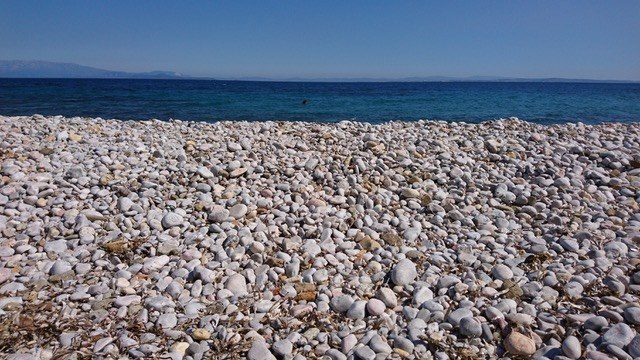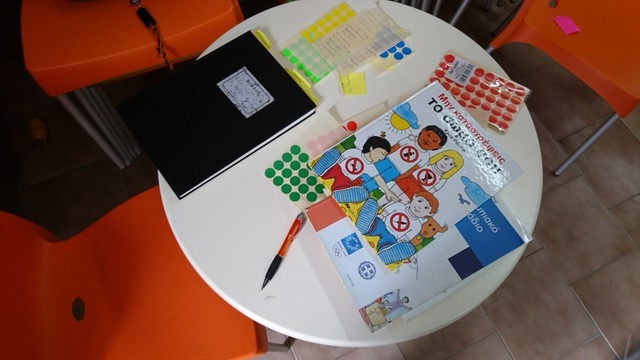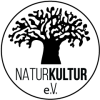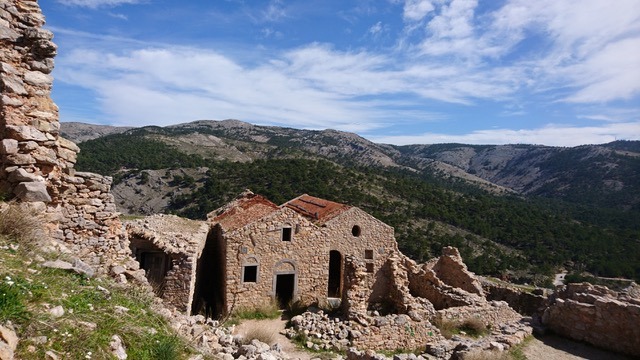Arriving at the airport of the Greek island Chios, I was lucky enough to directly meet another volunteer of the project “TES”: Technology, Education and Sports for which I was accept as volunteer. We were picked up by our mentor and brought to the house in the small costal town Vrontados which was supposed to be our home for the next months. We were warmly welcomed by the four other volunteers living in the house and started getting to know each other while enjoying the dinner.

The next day was a national holiday, the “clean Monday”, and therefore we got a chance to discover the island as our responsible brought us to an ancient mountain village called Avanatos where we were supposed to take pictures and films in order to make a short documentary of the site. The ruins of the stone houses build at a cliff perfectly fit in the steep rocky landscape with only little vegetation that is typical for the whole island. This was why the island population used the village to hide from invaders.
On the way back home, we stopped at a deserted sanatorium for lepra patients. Here again only ruins were left, but in some buildings painted walls and parts of the furniture were still recognizable. Even though the island is not huge, it is easily visible that it has an eventful history which often is due to the proximity to Turkey which nowadays also makes it a hotspot in the refugee crisis. This also became clear when we left the sanatorium and walked back home. We enjoyed the view on the beautiful blue sea which might have looked like in a catalogue for booking a holiday if it was not for the military and police boats. In addition, the other volunteers who have been on the island for longer explained to us that the island population was on strike the previous week to protest against the government’s plans to keep more refugees on the island.

When I went to “my” school on the next morning together with the other volunteer working there, however, I got another warm welcome and didn’t feel anything of the tensions. As one of the aspects of the project is education, the other volunteers and me, we usually helped in different schools and a kindergarten in the morning. To be more precise, this means doing simple tasks like photocopying, or crafting teaching materials in order to help the teachers. We also helped individual children in class and did other tasks during the school day, keeping everything in order and helping out in the library.
Even though I basically didn’t have any knowledge of the Greek language, the work at school was a good start in the day, as the communication with the children did not necessarily need spoken language and assisting the teachers in class or helping in the library helped to pick up some words or grammar.
 After some free time in the afternoon, it is time for the second aspect of the project: Technology. I learn from the other volunteers how to maintain several websites including the website chiosradio.gr of our internet radio. For the radio, we write, record and publish different articles every week. Whenever we have some time, we also write articles for the other websites or create short films, as for example about our excursions on the island.
After some free time in the afternoon, it is time for the second aspect of the project: Technology. I learn from the other volunteers how to maintain several websites including the website chiosradio.gr of our internet radio. For the radio, we write, record and publish different articles every week. Whenever we have some time, we also write articles for the other websites or create short films, as for example about our excursions on the island.
The last remaining aspect of the project, Sports, is the focus during the school holiday in summer. Before the summer begins, it only consists of playing with the children in the schoolyard during breaks.
During the first two weeks everything seemed to fall into place, and I started to feel comfortable in my new environment. Then, the Corona virus also reached Greece and the daily life changed as the government decided to close schools and shops and recommended to stay at home. Instead of working as assistant teachers in the morning, the other volunteers and I focused more on the computer work, gave the library of one of the primary schools a makeover and drew paintings in the schoolyard. When the government announced a lockdown, it become clear, that it would still take a long time until the schools would open again, and our life could go back to normal. However, staying positive, we volunteers thought of side projects to make use of the time we otherwise spent in the schools and decided to work on a new website and investing more time into our garden. Furthermore, most of us found (new)free-time activities, play Backgammon (which is very popular in Greece and spend more time on learning the Greek language now that it was not really a part of the everyday-life anymore.
To sum up, even though the Corona crisis strongly affects the project and daily life by restricting the public life, I believe that I can learn a lot from this project and look forward to the moment when it will be possible to interact with the local community again and when I can discover more of the island as well as the culture again.
Lea
Lea is part of our project “Global Change Makers”, financed by Jugend für Europa and the European Solidarity Corps Programme.

